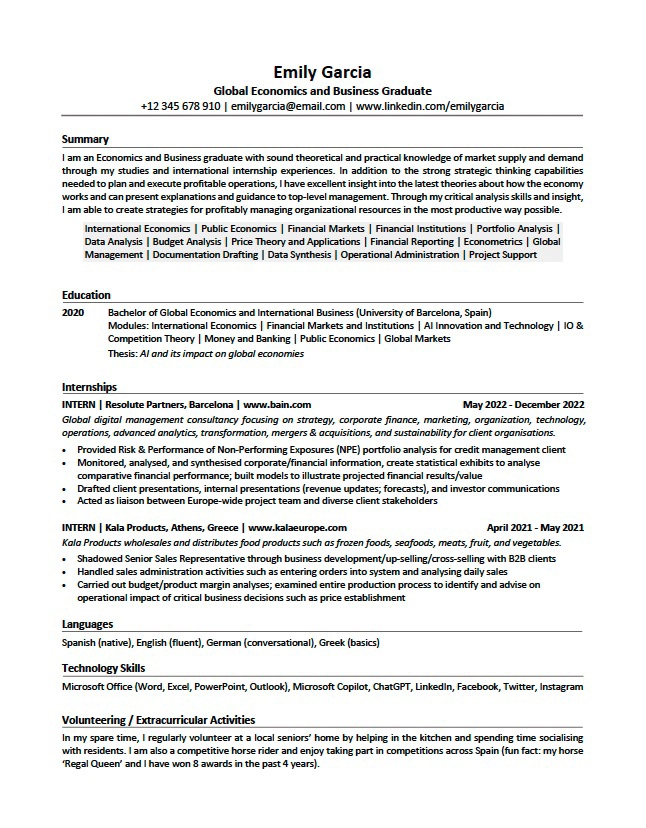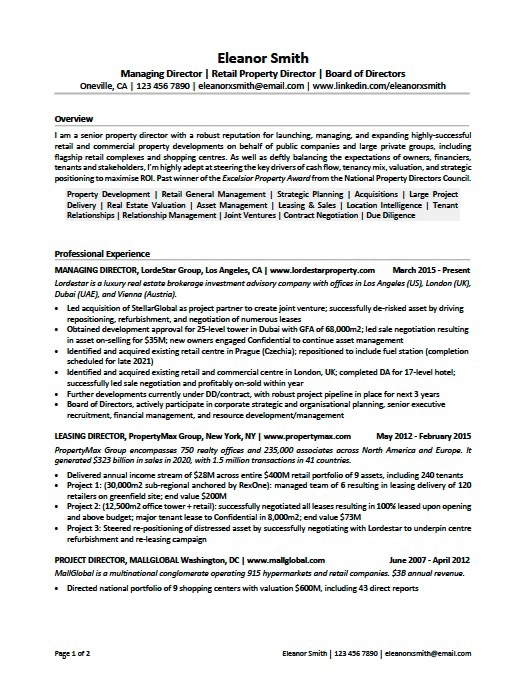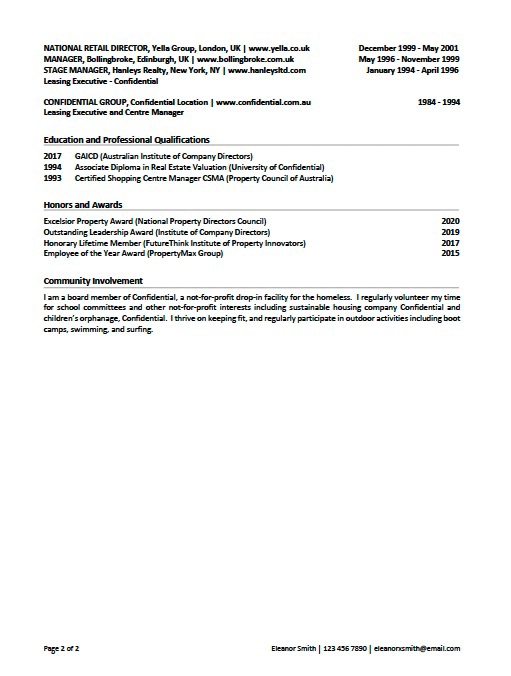How Long Should My Resume Be? Tips for Ideal Resume Length
Video: How long should your resume be? One page? Two pages? More?
This video is a must watch as we delve into the age-old debate about the ideal resume length and what recruiters and hiring managers really want to see. What You’ll Learn: The truth behind the “1-page resume” myth and when it’s actually ideal Understand why two pages are often the sweet spot for seasoned professionals Insights into scenarios where a 3-page (or longer) resume is appropriate Tips for using company descriptions to enhance your resume and keyword strategy
Clearing up the common confusion over ideal resume length
As long as there have been resumes, there has always been the burning question: how long should mine be?
You’ll see lots of conflicting advice out there about what length is best, which only adds to the confusion.
In fact, there’s even a current trend towards “1 page is best” from many so-called career experts, who may base their advice on what they prefer, rather than what works for companies and job seekers.
Yes, it’s true that recruiters spend only a few seconds deciding whether or not to read on. But let’s not assume that they have short attention spans! Your resume should immediately capture their interest, which has little to do with if it’s one or two pages long.
And while getting everything neatly onto one page sounds great in theory, this trend doesn’t take into account what actual recruiters and hiring managers think, or make allowances for different levels of experience.
On the one hand, packing your resume with too much detail over many pages won’t do you any favors. On the flip side, lopping off valuable experience can actually lead to lost job opportunities, even if a shorter resume is easier to maintain.
So: don’t blindly follow trends. Use common sense.
In this blog post, we’ll explore when you should use a 1-page, 2-page, or even 3-page+ format.
Not only do we have a team of career coaching experts here at JobLeads; but we’re also constantly in touch with hiring decision-makers, headhunters, and agency recruiters. This article will share what resume length is best for you, based on what real companies are looking for.
Bear in mind that while the following is internationally applicable advice, there may be certain country-specific variations. Always double-check the conventions for the country you’re applying to, to be on the safe side. In general, the advice in this post is
What should my resume include?
Before diving into recommended resume lengths, let’s remind ourselves of what a standard resume should (and shouldn’t) contain, so we know what should be dedicated to that valuable resume space. That way, you won’t be overcrowding it and making it unnecessarily long – or making it too short by leaving out useful details.
Generally, your resume or CV should include:
- A name / contact details section at the top
- A headline under your name (e.g. your current job title, or your desired job title)
- A short summary statement about who you are professionally
- A key skills box (highlighting your relevant hard skills for the job you’re applying for)
- Your career history (we’ll discuss what and how much to include in the following sections)
- Your education / qualifications
- Any awards or professional recognition
- Technology skills
- Languages
- Professional memberships (if applicable)
The precise order of these sections will depend on the job you’re applying for. For example, if you work in the tech sphere, then your technology skills will often go above your career history. If you’re a doctor or an accountant, your qualifications will also be mentioned before your professional experience (e.g., the medical school you finished).
Optional sections may also include volunteering and hobbies & interests. Whether or not you include these depends on if you feel these add value to the type of job and company you’re applying for.
If you have a degree and/or professional qualifications—such as an Evening MBA Degree —you can safely leave out earlier certifications (e.g. high school). The same advice applies to any clubs or activities you did in your earlier years: unless directly relevant and fairly recent, then there’s no need to include that spelling bee you won in Grade 12 or your cheerleading activities during university.
Tip: these days, resumes tend to be focused on specific expertise, rather than a complete and detailed career history. In general, you can reduce or even remove job descriptions from 8-10 years+ ago, as well as jobs not relevant to your current career focus. Your more recent roles are a better indicator of your seniority and current skill set. Hiring decision makers tend to focus on this, rather than earlier work.
When can I have a 1-page resume?
Very generally, a 1-page resume is best for students, recent graduates, or those with very little work experience. By very little work experience, this is (very roughly) 5 years or fewer.
In this case, the 1-page format gives you the space to expand upon your responsibilities and achievements authentically, whereas the 2-page format in this case the white space would visually draw attention to your relative lack of experience.
Certain common sections such as professional memberships can also be left out in this format, as they may not be relevant for more junior professionals.
Another time that a 1-page format can be appropriate is if you work in purely technical roles, for example in software engineering. As your tech skills, qualifications, and project types/achievements are of more interest to recruiters than lengthier job descriptions, these types of resumes can be kept fairly to the point.
Exception: if you’ve had many roles in a short time period (for example, noteworthy internships or multiple contract roles), a 2-page format may be more appropriate. Otherwise, the 1-page format can actually work against you, as it doesn’t enable you to fully showcase your relevant skills and expertise.

When is a 2-page resume best?
The 2-page format is the most common resume type.
It’s usually best for those with 6+ years of experience, i.e. mid-level professionals and above. That’s because it provides enough space to include the most essential sections listed at the beginning of this post, as well as any optional sections such as volunteering.
By this stage of your career, you have plenty of skills and accomplishments to highlight, and recruiters want to see this.
Another advantage of this length is that you can also include a brief company description (1-2 lines maximum). While this is not essential, a company description can help to highlight your industry or sector expertise, and pack in some additional keywords the recruiter may be looking for (e.g. SaaS).
Just because you have more space with this format, everything you include should be relevant and to the point. Consider reducing or cutting out job descriptions for roles going back 8-10 years or beyond, as these are less relevant to your current abilities.


What about 3+ pages or more? Can my resume ever be that long?
Yes.
Longer resumes are more common in academia and for project-based work.
For academia (e.g. adjunct professor, Head of Department, Principal, scientists, etc.), these tend to be much longer than standard resumes, as they may include sections for publications, extended professional development, research, presentations, and so on.
For project work, we recommend a standard 2-page resume, with any project summaries forming an appendix from Page 3 onwards. That way, hiring managers can easily skim through your professional history and qualifications first, then delve through your extended project experience if of interest.
Conclusion
To summarize: a 1-page resume is suitable for entry- and junior-level professionals, while the 2-page format is best for mid- to senior-level professionals.
Remember, these guidelines are a general rule of thumb. While some hiring managers may express specific preferences, the above advice reflects international standards.
If you’d like feedback on your resume/CV to see how it can be improved, take advantage of JobLeads’ FREE resume review. Our career coaches will share their insights on how to make your document even more impactful, so you can land that dream job faster! Good luck with your future role!
Key takeaways:
- A 1-page resume is usually best for students, recent graduates, or people at the early stage of their career (roughly under 5 years of experience).
- A 2-page resume is the standard length. It’s generally suitable for mid- and senior-level professionals (with, say, 6+ years or more of experience).
- A 3-page (or longer) resume is acceptable in academia and for project-based roles.
- There will always be exceptions to these rules, and certain hiring managers might have specific preferences. Unless stated otherwise, however, we recommend following the standard guidelines outlined in this post.
- JobLeads offers a free, no-obligation resume review service for professionals eager to get feedback on how their current document stands up. Find out more at www.jobleads.com.
What You’ll Learn: The truth behind the “1-page resume” myth and when it’s actually ideal Understand why two pages are often the sweet spot for seasoned professionals Insights into scenarios where a 3-page (or longer) resume is appropriate Tips for using company descriptions to enhance your resume and keyword strategy
For more insights, tips and strategies related to this topic, be sure to read our other articles: Cracking the Code of ATS - 10 Tips to Optimize Your Resume & How to Address Career Gaps on Your Resume - Tips & Examples
Related questions
How can I prioritize content if I have a lot of experience but want to keep my resume to 2 pages?
To prioritize content for a resume, focus on relevance and impact. Highlight experiences that align with the job you're applying for and emphasize roles/projects with significant impact. Use quantifiable outcomes where possible to demonstrate your contributions. This ensures the most compelling information is presented within a constrained space.
How can I identify industry expectations for the ideal resume length?
Different fields may have their own resume length norms. For instance, academic and scientific professions expect more detailed CVs, while business, technology, or creative industries tend to value brevity with impactful content. Knowing your industry's expectations and the company's preferences can help you determine the appropriate length and detail for your resume.
How can I effectively incorporate keywords into my resume?
To effectively incorporate keywords into a resume, start by carefully reading job descriptions and noting the skills and qualifications that frequently appear. Use these insights to tailor your resume, ensuring that your language mirrors the terminology used within your industry and the specific job listing. This approach not only helps in passing applicant tracking systems but also in demonstrating your suitability for the role in a way that feels organic and meaningful. Remember, the goal is to weave keywords into your narrative of professional achievements and qualifications, making your resume both ATS-friendly and compelling to human readers.
Explore more articles
- US Remote Work Statistics and Trends [2026 Study]
- Digital Nomad Guide - Top Jobs, Benefits & Best Places for 2025
- Employment Contract Explained: What Key Clauses Mean
- How to Spot and Avoid WhatsApp Scams & Online Fraud
- Stressed? Try These (Secret) Mindfulness and Meditation Techniques
- It's Not Up To Your Boss: Why Upskilling Is YOUR Responsibility!
- It's Not You, It's Them: How to Handle Workplace Bullies
- What Are Group and Panel Interviews and How to Ace Them!
- Decoding Job Descriptions: Here’s What Employers REALLY Want!
- Eyeing A New Job? How to Fix Job Skills Gaps BEFORE You Apply!